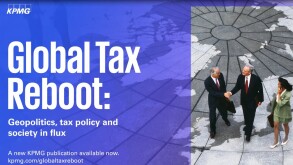The global anti-base erosion rules (GloBE) rules can have significant impact on the effective tax rate (ETR) of multinational enterprise (MNE) groups, and it is expected to result in many different implementation challenges, as well as an increase of the administrative burden for MNE groups that are in scope of the rules, particularly in the context of the yearly ETR and top-up tax calculations based on a jurisdictional blending.
You can find a full analysis of the latest release here, but in the meantime here are ten points on what tax leaders need to do in response to the OECD’s December 20 release:
1. Undertake a high-level evaluation of how the rules could potentially impact the MNE
This may involve the use of KPMG Assessment Tools and review of the MNE’s group structure. While the safe harbour rules have yet to be developed, a delineation can be drawn between entities that will clearly exceed the minimum ETR threshold and those that may not. It will also involve an assessment of whether a structure is likely to involve excluded entities or how certain tax concessions might operate. It should be remembered that the position of various entities can change significantly from year to year. It should also be noted that full jurisdictional blending is not required in some cases.
2. Understand the potential systems issues in collating data
Some information will be available through regular accounting information and some will need additional information to be gathered (for example, the extended definition of payroll, which includes certain types of independent contractors for the purpose of determining the substance-based exclusion income).
3. Ensure that there is strong liaison between tax teams and accounting teams on information
Because much of the information required is based on accounting data and delineations, particularly in relation to deferred tax, there is a need to ensure that data is available at the right level of granularity and integrity or robustness. In addition, the treatment and/or allocation of certain items of income or costs (including taxes) under the GloBE rules may differ from the accounting treatment in the financial accounts. The GloBE rules as outputs will also have accounting implications.
4. Consider a more detailed assessment model
After an initial evaluation provided above in 1-3, a more detailed assessment is likely to be appropriate to determine potential additional GloBE tax liabilities and the potential exercise of elections available. KPMG has a tool which can accommodate this more detailed assessment. This can be used to refine consideration of any elections.
Also, any transaction between Constituent Entities located in different jurisdictions that is not recorded in the financial accounts consistent with the arm’s length principle must be adjusted to be consistent with that principle.
5. Inform Board and Management Committees of the potential financial and administrative impact of the new GloBE rules
Ensure that your budget has included additional funds for compliance costs, and that those within the organisation that need to know are aware of the potential information gathering exercises to help streamline this process.
6. Establish Tax Control Framework for GloBE
The GloBE rules may result in an increase of the overall effective tax rate of an MNE group and therefore can have a significant cashflow and financial statements impact. Non-compliance can result in a higher level of scrutiny from the tax authorities, higher (tax) costs as well as brand and potential reputational damage. The MNE board’s tax governance needs to include a robust tax control framework that ensures compliance with these new rules.
7. Whether a central, regional or hybrid approach is going to be adopted for dealing with GloBE
This will depend on the organisation, but it is likely that some decentralisation will be required based on the need for local information.
8. Monitor how individual countries are reacting to GloBE and consistency of application
This includes amendments to introduce domestic top-up taxes or alternative minimum taxes, income inclusion rule (IIR) and undertaxed payment rule (UTPR) rules. Some countries may change tax-based incentives to grants and other forms of subsidy to better accommodate the rules.
While the rules seek to involve a consistent framework, there may be differences in how they are applied to domestic entities. The potential co-existence of global intangible low-taxed income (GILTI) rules is likely to present differences in application. The EU may well introduce additional elements that extend or ‘clarify’ the GloBE rules in comparison to other jurisdictions.
9. Consider future tax disclosures and interaction with the GloBE rules
There are an increasing number of disclosure regimes, both private and public, and early consideration of how they intersect is important. These include CbCR, GRI 207 and EU Public CBCR in addition to the GloBE rules.
10. Consider any secondary impacts for customers and investee communications
There may be many secondary effects for MNEs, including customer credit profiles, cash-based evaluations of investments and dealing with minority interests. Consideration of these impacts needs to be part of an implementation plan.




































